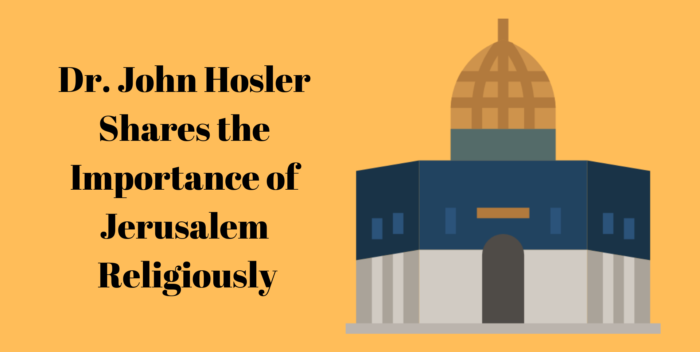Dr. John Hosler Shares the Importance of Jerusalem Religiously
The Dome of the Rock, pictured in the vector image, holds religious importance for Islam. It is also a well-known landmark in the city of Jerusalem.
By: Daniel Heitshusen
Concordia hosted associate professor of military history at Command and General Staff College, Dr. John D. Hosler, to speak to students about different topics of Jerusalem. Hosler’s speech, titled, “Target Jerusalem: The Strategic Place of the Holy City in the Middle Ages,” took place in Thom Auditorium on March 14.
Hosler’s talk revolved around the importance of Jerusalem religiously and the importance of its three different sieges, in A.D. 638, A.D. 1099 and A.D. 1187.
Hosler pointed out that Jerusalem is important religiously to Christians, Jews and Muslims. He gave detail as to how each religion values Jerusalem and what the significance is for that religion.
Hosler talked about how, for Christians, the death and resurrection of Jesus Christ, taking place in and around Jerusalem, is what makes it significant. The Church of the Holy Sepulchre, which resides in Jerusalem today, has paths leading to the traditional sites of Golgotha, the crucifixion, a stone marking where Jesus was prepared for burial, and the tomb itself.
Jerusalem’s significance for the Jewish people goes back to Genesis 22:1-2. The Temple Mount is believed to be the same place where Abraham took Isaac to sacrifice, but instead sacrificed a ram. King Solomon built the Temple in Jerusalem on the Temple Mount, which was later destroyed, but rebuilt by Herod the Great in the first century B.C. Herod’s Temple, however, was destroyed in A.D. 70. Nevertheless, in Jerusalem today the West Wall of the Temple, or the Wailing Wall, is still standing.
Finally, for Muslims, Hosler said that the significance comes from their Prophet Muhammad. Muslims believe that Muhammad took a night journey to Jerusalem, landing on the Temple Mount in Jerusalem, and was then taken into heaven. Today, the Dome of the Rock commemorates the spot where he ascended into heaven, and the al-Alqsa Mosque stands where he is said to have landed.
Having explained the significance of Jerusalem to Christians, Jews and Muslims, Hosler turned to focus on the sieges of Jerusalem. While there are many sieges of Jerusalem, he focused in on three specific sieges: One in A.D. 638, where the Muslims took Jerusalem, one in A.D. 1099, where Jerusalem was taken by the first Crusade, and the final one in A.D. 1187 by the famous Muslim warrior Saladin.
Hosler explained that a common theme in the sieges against Jerusalem is essentially: A big battle between the current inhabitants of Jerusalem and the invaders takes place, the defending army is eliminated, Jerusalem is weak and thus taken over by the new army.
Hosler closed his speech with a time for questions and answers. Hosler has also written books, the most recent of which is The Siege of Acre, 1189-1191: Saladin, Richard the Lionheart, and the Battle that Decided the Third Crusade published by Yale University Press, 2018.













